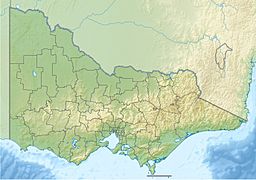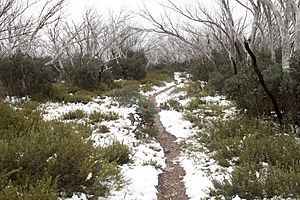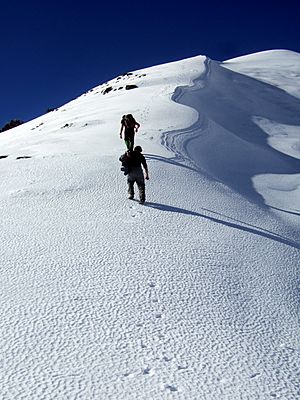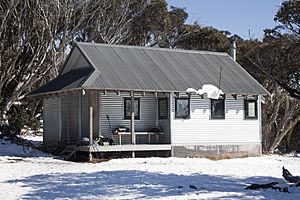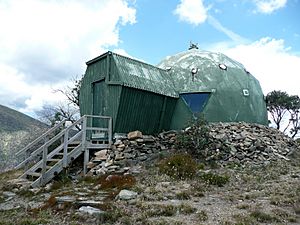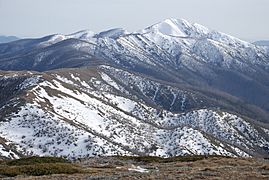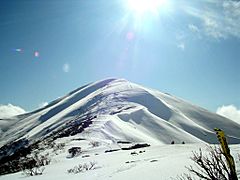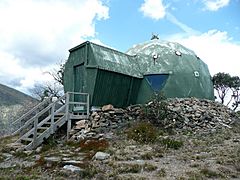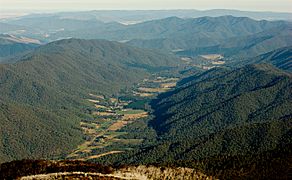Mount Feathertop facts for kids
Quick facts for kids Mount Feathertop |
|
|---|---|

Mount Feathertop as seen from the summit track.
|
|
| Highest point | |
| Elevation | 1,922 m (6,306 ft) (AHD) |
| Prominence | 562 m (1,844 ft) (AHD) |
| Geography | |
| Location | Alpine National Park, Victoria, Australia |
| Parent range | Victorian Alps, Great Dividing Range |
| Climbing | |
| First ascent | 1853: von Mueller (European) |
| Easiest route | Hike / ski: North Razorback track |
Mount Feathertop is a tall mountain in Victoria, Australia. It is the second-highest mountain in the state. You can find it in the Alpine National Park. Mount Feathertop is part of the Australian Alps.
This mountain is about 1,922 meters (6,306 feet) high. It often has snow from June to September. Unlike many other mountains in Victoria, Mount Feathertop has steep slopes at its top. Other mountains often have rounder tops.
Mount Feathertop is close to the Mount Hotham ski resort. This makes it a popular place for backcountry skiing. In winter, a large snow ledge, called a snow cornice, often forms along the top ridge. It is important to be careful around these cornices. Sometimes, snow stays in the mountain's gullies in spring. This snow looks like feathers, which is how the mountain got its name.
Contents
History of Mount Feathertop
Mount Feathertop was named in 1851. Two stockmen, Jim Brown and Jack Wells, gave it this name. They were among the first Europeans to explore the Bogong High Plains.
Dr. Ferdinand von Mueller was the first non-Aboriginal person to climb the mountain. He climbed it in 1853. He did not know it already had a name. He suggested calling it Mount La Trobe. This was after Charles La Trobe, who was Victoria's leader at the time. Later, in September 1889, members of the Bright Alpine Club made the first winter climb.
In 1906, a track was made from Harrietville. This track was similar to the current Bungalow Spur track. A simple shelter was built near a spring. In 1912, a better hut, Feathertop Hut, replaced it.
A guesthouse called the Feathertop Bungalow was built in 1925. It had 24 beds for guests. People used horses and sleds to bring materials up the mountain. This guesthouse was a popular place to stay. Sadly, it was destroyed in the big Black Friday bushfire of 1939.
Plants and Trees
The lower parts of Mount Feathertop are covered in forests. These forests have Mountain Ash trees. They grow up to about 1,000 meters (3,300 feet) high.
Above this, you will find Snow Gums. These trees are common up to about 1,700 meters (5,600 feet). Higher than that, above the treeline, the plants change. You will see alpine shrubs and grassland.
Ways to Reach the Summit
There are several main paths to climb Mount Feathertop. These include the Razorback tracks (north and south), Bon Accord Spur, Bungalow Spur, North-west Spur, and Diamantina Spur.
The North Razorback track is the shortest way to the top. It is also the easiest. However, it follows a ridge, so it can be very windy in bad weather. In summer, you can drive close to the summit. In winter, the road closes, and you have to walk or ski further.
The South Razorback is a popular path in summer. It is also a great ski trip in winter. This track starts near the Mount Hotham ski resort. It is mostly flat but can be very exposed to bad weather. The South Razorback track is about 11 kilometers (6.8 miles) long.
The Bungalow Spur track starts near Harrietville. It was built for horses carrying supplies to the old Feathertop Bungalow. This track climbs steadily for about 9 kilometers (5.6 miles) to Federation Hut. From there, it is another 2 kilometers (1.2 miles) to the summit.
The Tom Kneen track is on the North West Spur. It is a steep climb. This path leads to the Melbourne University Mountaineering Club hut. From the hut, the path continues across the mountain's west side to the summit.
The Diamantina Spur track climbs from the Kiewa River West Branch. It offers great views of Mount Feathertop. This track is steep in places and can involve climbing over loose rocks.
Mountain Huts
There are two main huts on Mount Feathertop that are still standing. There are also ruins of older huts.
An early shelter was built in 1906. It was replaced by Feathertop Hut in 1912. This hut was used for summer trips. It survived the 1939 bushfires but later fell apart. Federation Hut was built to replace it.
The Feathertop Bungalow was a hotel built in 1925. It was a successful place for visitors. However, it burned down in the 1939 bushfires and was never rebuilt. You can still see the site on the Bungalow Spur track.
Razorback Hut was a basic shelter. It was built after the First World War. This hut also burned down in the 1939 bushfires. It was never replaced.
In 1966, the Melbourne University Mountaineering Club built a large hut. It is at the top of the North-West Spur. This hut is a geodesic dome shape. It has a sleeping area upstairs. Hikers carried the building materials to the site.
Federation Hut was first built in 1968-69. It is located at the top of Bungalow Spur. The hut was rebuilt in 2005 by Parks Victoria. This was after it was destroyed by the 2003 Eastern Victorian alpine bushfires.
Safety and Rescues
Mount Feathertop can be a challenging place. It is important to be prepared for changing weather. Always be careful around snow cornices, which are dangerous snow ledges.
In 2009, Victorian Minister Tim Holding went missing on the mountain. He was on a solo hike. Many searchers, including police and rescue teams, looked for him. He was found uninjured the next day. He had lost his footing on an icy slope and slid into a gully. He waited for rescue, using a special reflective blanket. This story shows the importance of being prepared and staying calm.
There is a small memorial on a hill south of the summit. It remembers Molly Hill. In 1932, Molly slipped on ice while skiing. She slid down a steep slope and hit a tree. She was taken to the hospital but sadly passed away from her injuries. This event reminds us to always be careful when exploring the mountains.
Gallery
-
North-westerly view of the Ovens Valley and MUMC hut (extreme bottom of frame).
Images for kids
-
Mount Feathertop as seen from Mount Hotham.
See also
 In Spanish: Monte Feathertop para niños
In Spanish: Monte Feathertop para niños
 | Janet Taylor Pickett |
 | Synthia Saint James |
 | Howardena Pindell |
 | Faith Ringgold |


